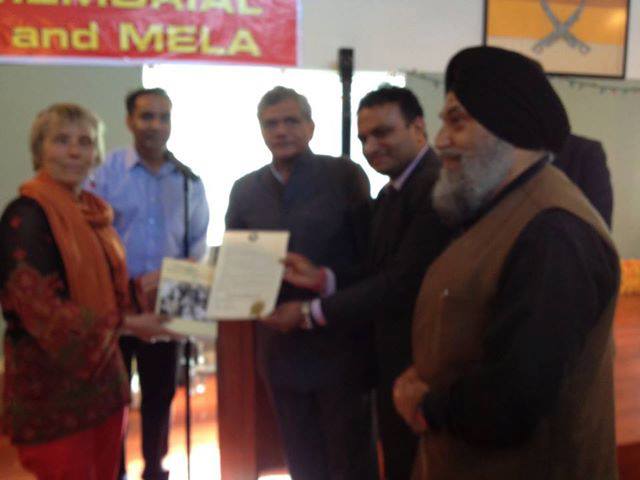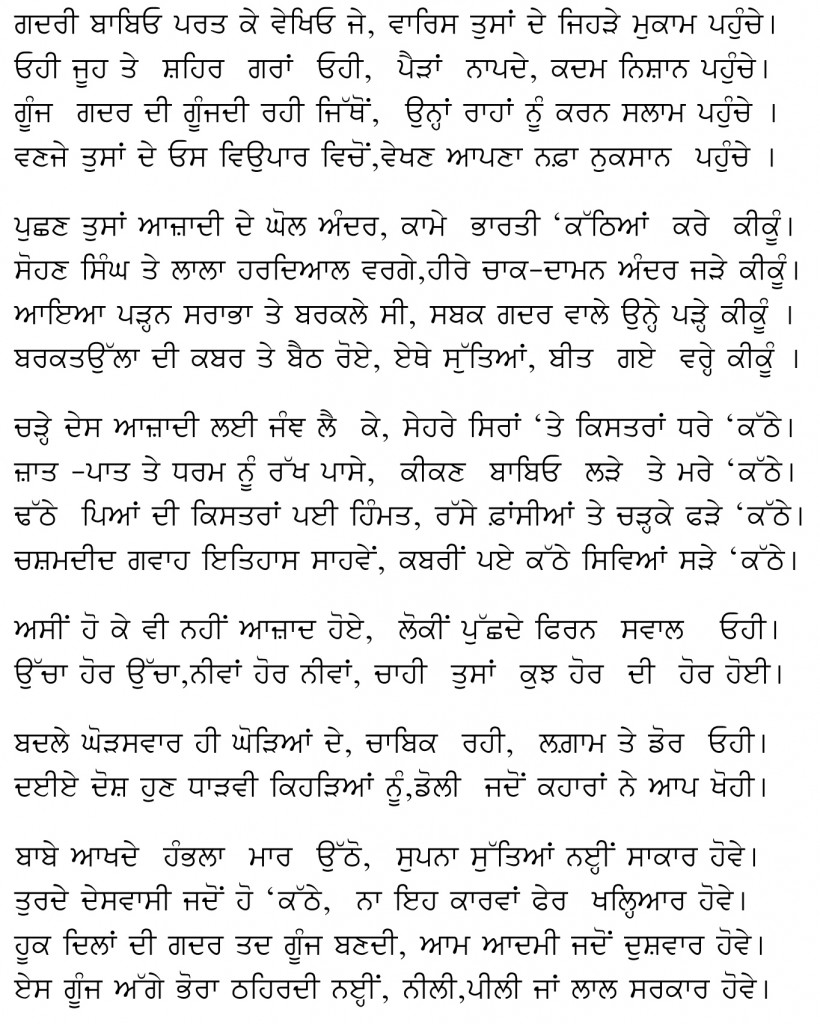
The Ghadar Party was founded in a distant land from India in San Francisco a century ago in 1913. The centenary celebration was held at the ‘Yugantar Ashram’ the original headquarters of the Ghadar Party at 5 Wood Street in San Francisco on July 13, 2013!
I was invited to attend, along with two other community members from the Central Valley of California – Charanjit Singh Batth, affectionately known as the ‘Raisin King’ being the most successful grape grower in America, and Bharpoor Singh Dhaliwal, the former Mayor of the City of San Joaquin.
It was a momentus occasion for all of us and especially for me as I stood in the place where history was being made for a second time. A close relation, I spent my formative years under the guidance of Baba Sohan Singh Bhakna, one of the founding members of the Ghadar Movement in the village of Bhakna in India. He introduced me to Ghadar Poets and other revolutionary poetry, published in the progressive literary magazine, Preet Lahri.
When we arrived at the tiny hall at the Yugantar Ashram, it was jam packed with approximately 200 men, women and some university students who travelled far and wide to be a part of history. There were many prominent people in attendance, such as guest of honor, Sita Ram Yechury, a member of the Rajya Sabha, as well as main speakers Dr. Johanna Ogden, a historian from Astoria , Oregon, Dr. Mark Juergens Meyer, Dr. Harish Puri from GND University Amritsar, Dr. Jaspal Singh, Vice Chancellor and Drs. Jaswinder Singh, Dhanwant Kaur of Punjabi University, Patiala, Hardam Singh Azad from Houstan – Texas, Harsev Singh Bains IWA, Great Britain and Dr. Mohinder Singh Member Bhai Veer Singh Sahit Sadan from Delhi , India. The Indian Consul General’s office was in attendance and a handful of young students from the Universities of Stanford and Berkley also paid their tributes.
The program was well organized and concentrated to highlight and revisit the Ghadrites unique contribution they made towards the Indian freedom struggle. The line I liked best and that said it all, was by Dr. Mark Juergens Meyer. Dr. Meyers looked genuinely excited when he said that he was very proud to be a Californian knowing that the first flag of Indian Independence was flown from this very place, the Yugantar Ashram at 5 Wood Street, San Francisco in California in 1913. I said to myself what a shame! How come the successive Indian governments and people who came in power and ruled India since they got freedom from the British subjugation of 200 years, did not realize this proud fact before Dr. Meyer did? Or were they not genuinely proud as Dr. Meyers was? I found no answer. But that reminded me the age old Punjabi phrase,” ਸ਼ੇਰਾਂ ਦੀਆਂ ਮਾਰਾਂ ਗਿਦੜ ਖਾਂਦੇ ਆਏ |” – Sheran dian maraan Giddarh khande aiey’ meaning the kills made by brave lions are always eaten to the bone by the cowardly jackals.
 The aspect I found totally missing however, was the mention of the Ghadrite poetry at the centenary celebration. The commemoration was only for the Ghadrites as warriors and nothing much about their poetry which equally if not more significantly inspired their countrymen. The charge of the handful of Ghadrites against the British Empire where the Sun never set was no less an act of patriotism than the well recorded ‘Charge of the Light Brigade’ during the battle of Balaclava, when the 700 rode to the valley of death. But very few people know Ghadrites were poets at heart also. After all it was the poetic lines which Shahid Kartar Singh Sarabha kept singing while hand operating that rackety printing press at the Yugantar Ashram to print the Ghadar newspaper:
The aspect I found totally missing however, was the mention of the Ghadrite poetry at the centenary celebration. The commemoration was only for the Ghadrites as warriors and nothing much about their poetry which equally if not more significantly inspired their countrymen. The charge of the handful of Ghadrites against the British Empire where the Sun never set was no less an act of patriotism than the well recorded ‘Charge of the Light Brigade’ during the battle of Balaclava, when the 700 rode to the valley of death. But very few people know Ghadrites were poets at heart also. After all it was the poetic lines which Shahid Kartar Singh Sarabha kept singing while hand operating that rackety printing press at the Yugantar Ashram to print the Ghadar newspaper:
“ਸੇਵਾ ਦੇਸ ਦੀ ਜਿੰਦੜੀਏ ਬੜੀ ਔਖੀ, ਗੱਲਾਂ ਕਰਨੀਆਂ ਢੇਰ ਸੁੱਖਲੀਆਂ ਨੇ।
ਜਿਨ੍ਹਾਂ ਦੇਸ ਸੇਵਾ ਵਿਚ ਪੈਰ ਪਾਇਆ ਓਹਨਾਂ ਲੱਖ ਮੁਸੀਬਤਾਂ ਝੱਲੀਆਂ ਨੇ।“
Seva Des di Jindrie badi aukhi, gallan krnian dher Sokhlian ne,
Jinhan Des –Seva vich pair paya, Ohna lakh Musibtan Jhallian ne.
(Meaning it is easy to talk big about it but serving the country is very difficult. That those who served had to bear countless hardships.)
These lines associated with Shaheed Kartar Singh were also said to be the favorites of Shaheed Bhagat Singh that were found in his pocket before he was hanged. The Ghadrites wrote poetry in other languages too but what attracted me most was the poetry in Punjabi in the most prevalent and popular folksy tunes such as: Heer Waris named after the most popular and tragic love story. I paid a tribute by presenting a Punjabi poem in the same metering mode called behr of baint in which most of these poems were usually written for the Ghadar newspaper. The Ghadrites also sang these poems in the battlefield, in the trial courts, on the gallows and during hunger strikes in jails. I also sang in the same tune as these are usually sung, which I will upload as a free audio download if you would like (just ask!).
I have transliterated my poem into romanized Punjabi for the benefit of those who can’t read Gurmukhi, and there is a rough English translation below as well at the gracious request of the historian, Dr. Johanna Ogden of Astoria, who listened to me sing my poem in San Francisco and wanted to know what it was about!
Here is my Punjabi poem:
Romanized:
Ghadri Babeo prt ke vekheo je, Waris Tusan de Jehre Mukam pahunche
Ohi Juh te Shehar , Gran Ohi, Pairhan Napde kadm – nishan Pahunche
Goonj Ghadr di Goonjdi Rhi Jitthon, ohna rahan nu krn salam Pahunche
Va nje Tusan de Os Vipar vichon, Vekhn apna Nafa – Nuksan Pahunche
Akhnn tusan Azadi de ghol ander, Kame Bharti ‘Kattean kre keekun
Sohn Singh te Lala Hardyal verge, Heere Chalk-daman ander jareh keekun
Aeya Parrhn Sarabha te Berkley si, Sabk Ghadr Vale Ohne Parrhe Keekun
Barkatullah di Kabr te baitth Roe, Etthe Sutean Beet Gai Vareh Keekun
Charrhe Des – Azadi lai jnj lai ke, Sehre siran te Kistran dhre ‘ Katthe
Zat-Pat te Dharm nu rkkh pase, Ghdri Babeo Larhe te Mre ‘Katthe
Dhatthe pian di Kistran pai Himmat, Rsse Fansian te Charh ke Fareh ‘Katthe
Chashm-deed Itihas Gwah Sanhven,Kabrin pai ‘Katthe, Sivean Sareh ‘Katthe
Asin ho ke vi nhin Azad Hoe, Lokin Puchhde Firn Swal ohi
Ucha hor ucha nivan hor nivan, Sochi tusan kujh hor di hor hoi
Bdle Ghorh-Swar e Ghorhean de, Chabak Rhi Lugam te Dore Ohi
Daie dosh hunn Dharhvi kehrean nu, jdon Doli Kaharan ne aap Khohi
Babe Akhde Humbla maar Uttho, Supna Suttean Nahin Sakar Hove
Turde Desvasi jdon ho ‘Katthe, Tan eh Karvan na Khalihar Hove
Hook dilan di Ghadr tad Goonj bndi, aam Admi jdon Dushwar Hove
Os Goonj Sanhven Bhora Tthehrdi nhin Nili, Pili jan Lal Sarkar Hove!
Rough English Translation:
Ghadrites come and watch how far they have come. It is the same place, farms and factories you once worked; the paths you treaded. It is the same hilltop whence your call for freedom resonated around the world. As your heir apparent they have come to figure out what to make of the investment you had made!
They ask how you organized ordinary Indian laborers in to the struggle for total Independence. How did you set the jewels like Sohan Singh and Lala Hardyal into your torn down garment? Sarabha came here only to seek higher education; how he received lessons to become a mutineer? They stopped and wept at the grave of Barkatullah; how come you have slept here for so long?
Riding for the wedding of bride freedom from a distant land; how you tied the ceremonial garlands on all heads together? How you kept the cast, creed and religion out and aside and fought against the oppressor as one people? Lying low as underdogs for so long; how you mustered the courage to stand up to the oppressor and fought to the finish? History bears witness; how you all shared the grave and the cremation ground hand in hand?
Having got freedom we are still not free; how come people are asking the same question again? The rich got richer and the poor poorer; you thought of something but something else happened. Only the horse riders changed; the whip, the bridle and the hunting rope stayed the same. How can they blame the outside marauders, when the palanquin is robbed by the palanquin bearers themselves?
Ghadrites say! Rise again for a second Ghadar; the dreams never come alive sleeping. When all countrymen unite as one people to move forward; the caravan fighting injustice and inequality becomes unstoppable. The heart ache stemming from hopelessness brings out a rebellion that turns to an echo resonating louder and louder as common man’s life becomes more difficult. Confronted with such a resonating echo; no oppression of any kind or color stands its ground.

Leave a Reply